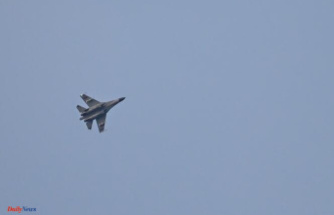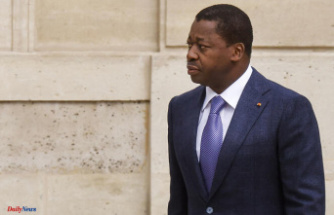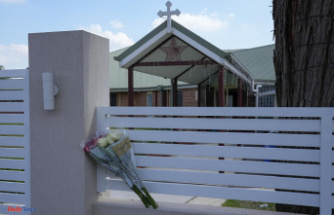Fear is a constant theme in Afghanistan's media landscape.
KABUL (AP) -- Banafsha Binesh, a reporter from Afghanistan, is accompanied by fear every morning as she departs her Kabul home to report at the newsroom of Afghanistan's largest TV station.
The Taliban fighters are the first to be seen, as they throng the capital's streets with their weapons on their shoulders. Binesh, 27 years old, says that she is more afraid of their harshness towards women than any unpleasant encounter.
Every new report from a colleague journalist who has been interrogated, beaten or detained by Taliban fighters creates fear and uncertainty.
Binesh, who works at TOLO-TV, said that "work is stressful."
The country's new rulers took power six months ago and have issued directives to journalists requiring them to follow Islamic principles and work for the national good. These rules seem to be aimed at suppressing independent reporting.
Bilal Karimi, the Culture and Information Ministry's deputy spokesperson, stated that criticism can be tolerated but must also be constructive. Steven Butler, from the Committee to Protect Journalists, said that it is not yet clear if attacks against journalists are planned or random events. This could have been initiated by a Taliban official with a grudge.
Butler, Asia program director at CPJ, said that the landscape is full of dangers that aren't fully predictable. Journalists are being selected and interrogated about coverage. They are then beaten and released after hours or even days.
Two journalists who were working for the U.N. refugee organization were detained for six days, and then released last week after alarming the U.N. After verifying their identities, the Taliban claimed they released the journalists.
Butler expressed concern that Taliban intelligence officers are becoming more "hands on" and have been involved in increasing arrests and disappearances.
One trend-buckling development is that TOLO now has more female journalists than male reporters, both in the newsroom as well as on the streets.
Khpolwak Sapai, TOLO news director, said that he had made it a point to hire women after almost 90% of his employees fled or were evacuated during the Taliban takeover.
He stated that while Taliban authorities have not threatened female staff members, they have denied them access at times due to their gender.
One case saw a TOLO reporter barred from briefings by the acting minister for mines and petroleum after he discovered that the station had sent a woman there.
Sapai stated that TOLO quickly covers such incidents. Foreign governments and other organizations evacuated or fled tens of thousands Afghans.
Reporters Without Borders' December survey and the Afghan Independent Journalist Association's December survey found that 231 of 543 media outlets had shut down, and more than 6,400 journalists were fired after the Taliban tookover. According to the report, outlets were closed due to lack of funds or journalists leaving the country.
The Taliban banned all newspapers, television and radio during their rule in the late 1990s. Foreign news agencies were allowed to operate in that period, as well as some local media outlets.
Faisal Mudaris was a journalist, blogger, and YouTube personality who spent eight days in Taliban custody. He claimed that he was threatened and beaten.
Mudaris hails from the Panjshir Valley in the restive Panjshir Valley. This valley was the sole holdout against Taliban rule in their first weeks of power. Mudaris was imprisoned in a Taliban prison because of his Panjshiri ethnicity. He fears that he is still at risk and that no one will hold the Taliban responsible.
Journalists of other ethnic minorities, such as the Hazaras, who have been subject to discrimination by successive governments for years, are also concerned. A number of journalists from Etilaat Roz, a small media outlet, were detained and beat in the first months following the Taliban takeover. Both were Hazaras.
Karimi claims that no one is being targeted for their ethnicity, and promises to investigate the Taliban. CPJ's Butler stated that his advocacy group does not have the ability to measure ethnicity-based attacks.
There is still room for criticism under the Taliban. TOLO repeated a clip showing Taliban fighters beating an ex-Afghan soldier.
In just days, the Taliban's top leader, Hibatullah Akhunzada, warned Taliban fighters to avoid excesses and promised them punishment. He promised to give amnesty to former soldiers.
"Did the news article bring about a change?" Sapai, TOLO's news director, said that he believes it contributed to the change.
Sapai stated that the Taliban have a range of views, from those who hold on to the past to those who seek a more open society where education and work are available for all -- even girls.
He said that the Taliban's domestic and international pressures should not be underestimated. He stated that most Taliban leaders accept the fact that Afghanistan and the rest of the world are different and that it's difficult to turn back time, but they still have differences.
Journalists worry about the uncertainty surrounding which view will prevail.
Asma Saeen (22), TOLO reporter, said that the fear we have is about the day when the Taliban will stop us doing the work we do. "This is my biggest fear and my constant anxiety."
She doesn't recall the Taliban regime of the 1990s, but she said that she was able to continue working unassisted. She is still upset about the restrictions placed on women and girls, such as banning teenage girls from returning to school and preventing women from being allowed back to work.
Both Saeen & Binesh desire to leave Afghanistan. They both long for the freedoms that they had before the Taliban took power.
Binesh stated, "We didn't expect that after 20 years democracy, we would face these many restrictions." "I'm ready to go."












